
Washington, DC—The US Department of Agriculture’s Wildlife Services program reported last week that it had shot, trapped, and poisoned more than 400,000 native animals in 2021. The death toll included more than 64,000 coyotes, 24,000 beavers, 3,000 foxes, and hundreds of gray wolves, black bears, mountain lions, and badgers, among many other species.
Wildlife Services is tasked with responding to human-wildlife conflicts, but its use of tools such as steel-jaw leghold traps, body-gripping Conibear traps, neck snares, and M-44 cyanide devices is cruel and inherently indiscriminate. The recently released numbers are in line with the program’s kill statistics from 2020 and include more than 2,500 animals that were killed unintentionally, such as black bears, mountain lions, coyotes, porcupines, raccoons, fishers, pronghorn antelope, bighorn sheep, and eagles.
In addition, traps and snares set for beavers have accidentally killed otters, turtles, and herons. These collateral deaths—as well as the preventable killing of beavers themselves—are among the reasons why the Animal Welfare Institute (AWI) is urging the creation of a federal grant program to help landowners, local governments, and state and federal wildlife agencies pay for the use of nonlethal measures to prevent human-beaver conflicts. AWI also has long supported the Beaver Institute, a Massachusetts-based nonprofit organization that educates the public about how beavers benefit ecosystems, works with landowners and local governments to implement preventative measures such as flow devices, and trains wildlife professionals, including federal employees, on how to properly install and maintain such devices.
Marjorie Fishman, Animal Welfare Institute
[email protected], (202) 446-2128
The Animal Welfare Institute (awionline.org) is a nonprofit charitable organization founded in 1951 and dedicated to reducing animal suffering caused by people. AWI engages policymakers, scientists, industry, and the public to achieve better treatment of animals everywhere—in the laboratory, on the farm, in commerce, at home, and in the wild. Follow us on Facebook, Twitter, and Instagram for updates and other important animal protection news.